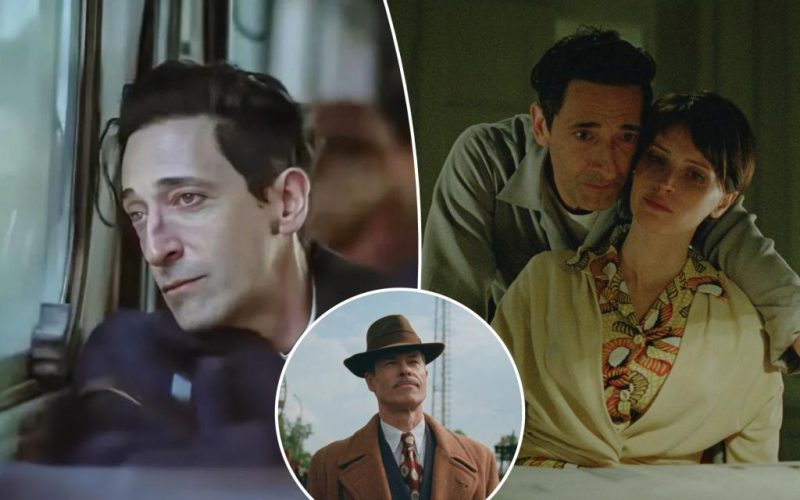movie review
THE BRUTALIST
Running time: 215 minutes. Rated R (strong sexual content, graphic nudity, rape, drug use and some language).
In every sense, the extraordinary director Brady Corbet’s period drama about a Jewish architect who emigrates to the US after World War II is mammoth: its decades-long story, titanic set pieces and, perhaps most of all, the headline-making runtime.
“The Brutalist” lasts more than three and a half hours and includes an intermission — making it the first major movie to have an added break since 1982’s “Gandhi.” (Note that at some 70 millimeter screenings in New York, the interval goes on for nearly a half hour to allow for switching film parcels).
But don’t let the marathon length scare you away. Because parallel to its grand scale is its outstanding quality. As the year comes to a close, “The Brutalist” finally hands us a bewitching epic for adults that 2024 otherwise lacked.
Adrien Brody, doing some of his finest work since “The Pianist” 22 years ago, plays Laszlo Toth, a fictional Hungarian designer who arrives in America in the 1940s at the bottom rung of the social and professional ladder and gets dirt in his nails clawing his way to success while his personal life disintegrates.
The actor gives all of himself to the part, bringing to thrilling life the complex blueprint of a visionary, a puddle of tears, tyrant, wallflower, addict, singular talent and sympathetic everyman.
Temperamental Laszlo’s harrowing ride and Corbet’s feast of a film are mutually ambitious.
Although the architect desires a safe and prosperous life for his family far away from the horrors of the Holocaust, his passion for realizing bold, modern structures tends to win out. As do his demons: booze, drugs, sex. He’s far from morally heroic.
And Corbet, at a spry 36, aspires to make the kind of sprawling and sophisticated movie he grew up watching but hardly ever hits cinema screens anymore. He’s done just that, to say the very least.
Many of the visuals Corbet magics up with cinematographer Lol Crawley — a trumpeted arrival at Ellis Island, a light-drenched library, a mausoleum-like Italian marble quarry — are as sumptuous as anything in last year’s “Oppenheimer.” But “The Brutalist” only cost about one tenth of that to produce. The team should teach a budget class.
The first few steps of Laszlo’s journey are familiar, if weightier than usual. He hops a bus from New York to Philadelphia and encounters hurdles along the way: assimilated family members he no longer recognizes or understands, bigots, low-wage work, the breadline.
His circumstances improve — it’s not that simple, though — after he stunningly remodels a mansion’s book room for the son (Joe Alwyn) of an Andrew Carnegie-esque millionaire, Harrison Lee Van Buren (Guy Pearce, what a live wire).
Laszlo’s project winds up in a magazine and becomes the talk of the town.
Image-conscious Harrison then hires the Hungarian to build an expensive showstopper monument to his late mother, and a community center, in his novel brutalism style.
The perilous struggles of construction are only topped by the tension around the kitchen table.
The first half of Corbet’s film is not dissimilar to “Tar,” starring Cate Blanchett, in that the writing, performances and locales are so precisely detailed, you might very well think you’re watching a biopic about a real man you’ve never heard of.
Then during Part Two, after you return with fresh popcorn, the movie shifts focus to more intimate and sordid character troubles that would be redacted from any history book.
Laszlo’s wife Erzsébet (Felicity Jones, crumbling dry ice) arrives, shell-shocked and wheelchair-bound, with her mute niece Zsófia (Raffey Cassidy) to discover their marriage has lost its spark. What brings them together, no licensed therapist would recommend.
Back on the building site, the architect’s personal-professional relationship with Harrison turns thorny and ventures in a shocking direction.
Corbet’s climax of exposed secrets and ruined lives inside a palatial compound has shades of “The Great Gatsby.” And some will find that the last hour and 45 minutes flirt with soap-opera and are less preferable than the first chapter. Not me. It’s the gutsy tonal changeup and the sharp turn away from the typical rags-to-riches immigration movie map that holds our interest for nearly one-sixth of a day.
To say I was never bored wouldn’t be quite right.
Rather, I was always transfixed.
With his thunderous achievement, Corbet instantly becomes one of the most exciting young directors in brutal Hollywood.
Nay, one of the most exciting directors. Period.








